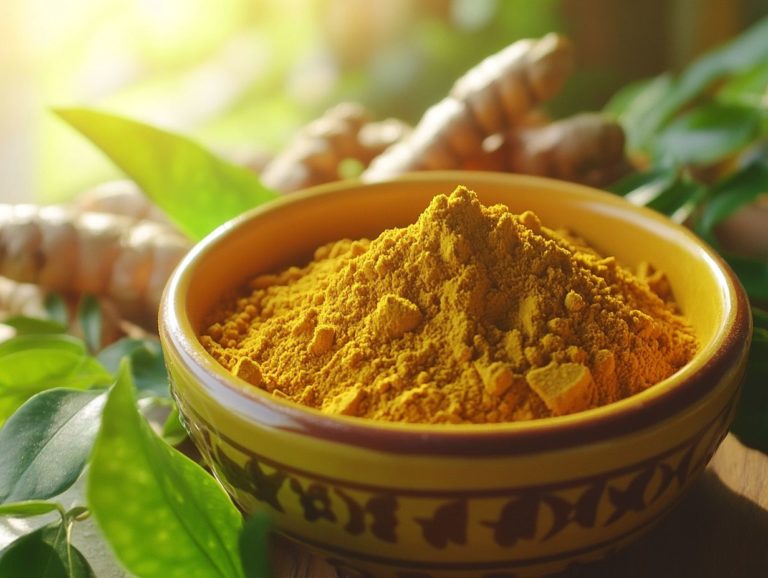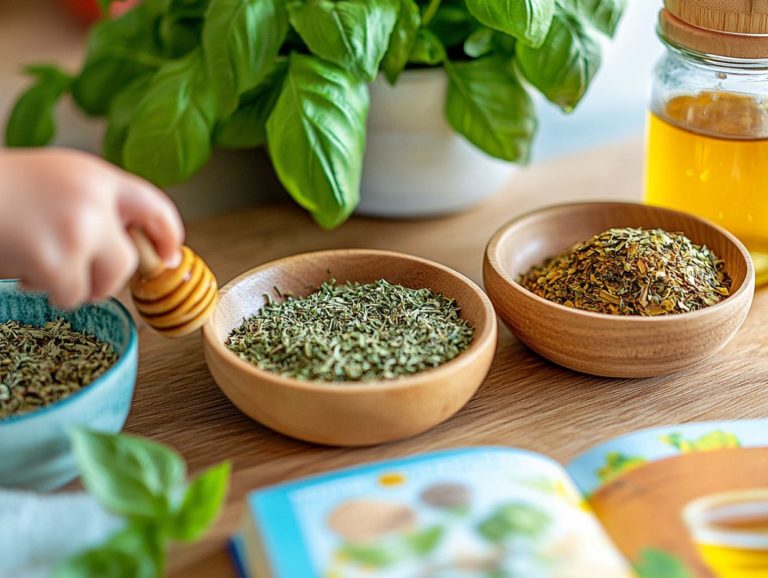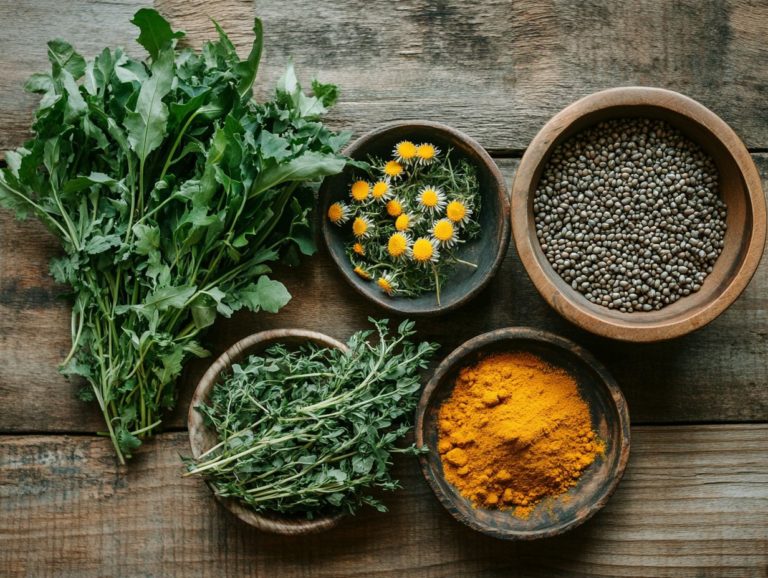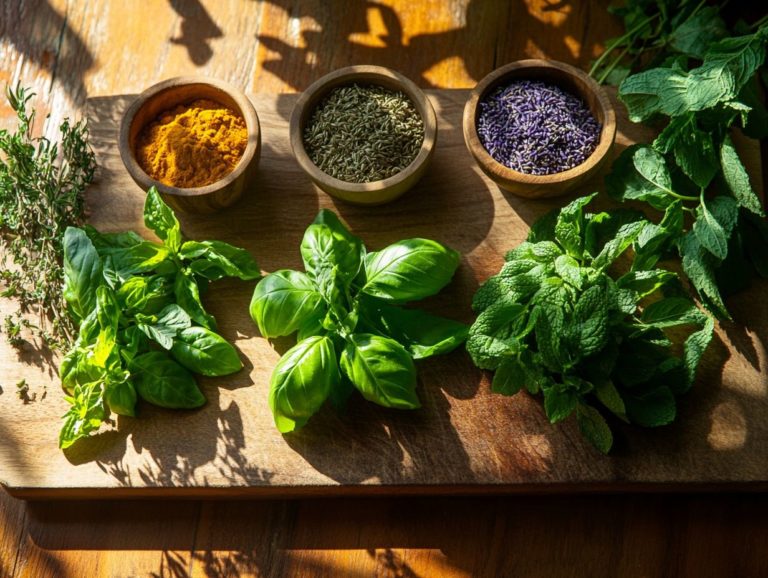5 Popular Herbs and Their Health Benefits
For centuries, people have loved herbs for their amazing flavors and health benefits.
In this exploration, you ll uncover five popular herbs turmeric, ginger, garlic, cinnamon, and holy basil that truly pack a powerful punch in enhancing your well-being. This piece delves into their anti-inflammatory properties, medicinal uses, and immune-boosting capabilities while offering practical tips on how to seamlessly incorporate them into your cooking and lifestyle.
You ll learn about their nutritional profiles, potential side effects, and the scientific evidence supporting their benefits. Get ready to see how these amazing herbs can boost your health like never before!
Contents
- Key Takeaways:
- 1. Turmeric: The Golden Spice with Powerful Anti-Inflammatory Properties
- 2. Ginger: A Versatile Herb with Numerous Medicinal Uses
- 3. Garlic: A Natural Remedy for Various Health Issues
- 4. Cinnamon: A Sweet Spice with Surprising Health Benefits
- 5. Holy Basil: An Ayurvedic Herb with Immune-Boosting Properties
- How Can These Herbs Be Used in Cooking?
- What Are the Key Nutrients and Compounds Found in These Herbs?
- What Are the Potential Side Effects of Using These Herbs?
- What Are the Different Forms of These Herbs Available in the Market?
- How Can These Herbs Be Incorporated into a Healthy Lifestyle?
- Are There Any Scientific Studies Supporting the Health Benefits of These Herbs?
- Frequently Asked Questions
Key Takeaways:
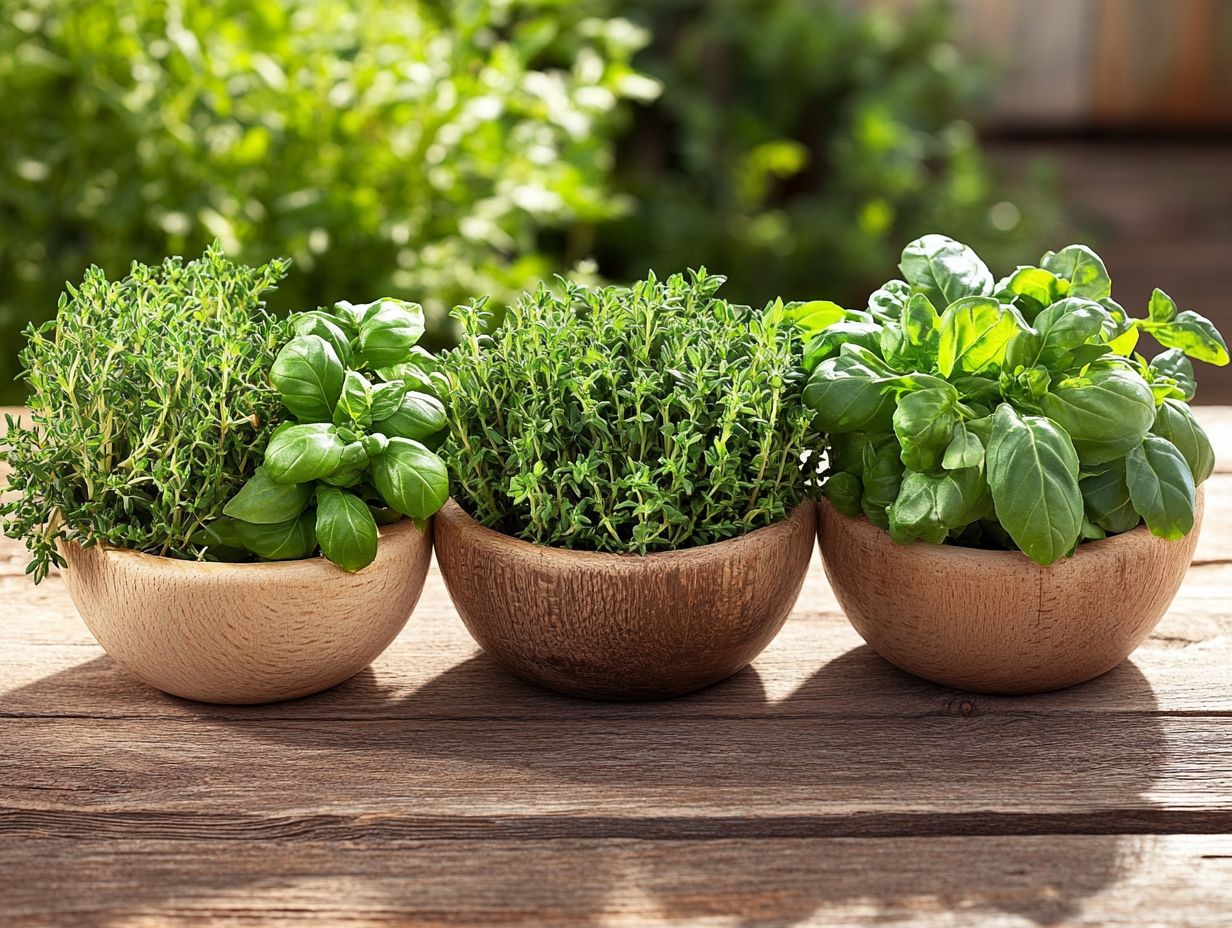
Turmeric isn t just a spice; it s a powerhouse for reducing inflammation and improving your health. Ginger is a versatile herb with numerous medicinal uses and can be used in cooking or consumed as a tea for its health benefits. Holy Basil, a traditional Indian herb, has immune-boosting properties and can be consumed as a tea or added to dishes for its health benefits.
1. Turmeric: The Golden Spice with Powerful Anti-Inflammatory Properties
Turmeric, often hailed as the golden spice, is celebrated for its remarkable anti-inflammatory properties and extensive health benefits. It is an essential element in both traditional medicine and contemporary herbal supplements.
This vibrant yellow root, abundant in curcumin, not only elevates your culinary creations but also acts as a powerful herbal remedy. It is known for alleviating various health conditions, such as joint pain and digestive issues.
In the realm of traditional Indian medicine, turmeric has been treasured for centuries for its ability to promote overall wellness. It enhances your immune system and combats oxidative stress through its potent antioxidant effects.
By neutralizing free radicals in your body, this herbal gem supports cellular health and may help reduce the risk of chronic diseases.
You ll often find it paired with other supplements like ginger and black pepper, which significantly boost curcumin absorption and amplify its anti-inflammatory effects.
This harmonious combination not only aids in pain relief but also fosters a holistic approach to health, improving digestion and enhancing vitality in your daily life.
2. Ginger: A Versatile Herb with Numerous Medicinal Uses
Ginger is a remarkable herb, celebrated for its myriad medicinal uses, especially in easing gastrointestinal discomfort, nausea, and inflammation. It has become a staple in culinary creations and herbal remedies around the globe.
You can find this incredible root in various forms fresh ginger, dried powder, or concentrated herbal extracts allowing you to easily incorporate it into your daily routine.
In traditional medicine, ginger has been treasured for its potent antioxidant properties, which help combat oxidative stress and bolster overall health. Many individuals are now opting for dietary supplements infused with ginger extracts, offering a convenient way to reap its benefits without the hassle of extensive preparation.
Integrating ginger into your wellness regimen not only elevates the flavor of your foods and beverages but also supports a holistic approach to your health and well-being.
3. Garlic: A Natural Remedy for Various Health Issues
Garlic is not just a culinary superstar; it s also celebrated as a natural remedy for various health concerns, boasting impressive medicinal properties, including antioxidant and anti-inflammatory effects.
Its benefits shine particularly bright when it comes to promoting cardiovascular health. Research suggests that garlic may help lower blood pressure and reduce cholesterol levels, ultimately contributing to a healthier heart.
The rich sulfur compounds in garlic also enhance immune system function, making it a key player in traditional remedies designed to ward off illness.
Often found in herbal supplements, garlic acts as a powerful preventive health tool, frequently combined with other natural ingredients to enhance its supportive effects.
Across centuries, cultures worldwide have harnessed garlic’s healing properties, highlighting its versatility and importance in holistic wellness.
Try adding these herbs to your meals this week and feel the difference!
4. Cinnamon: A Sweet Spice with Surprising Health Benefits
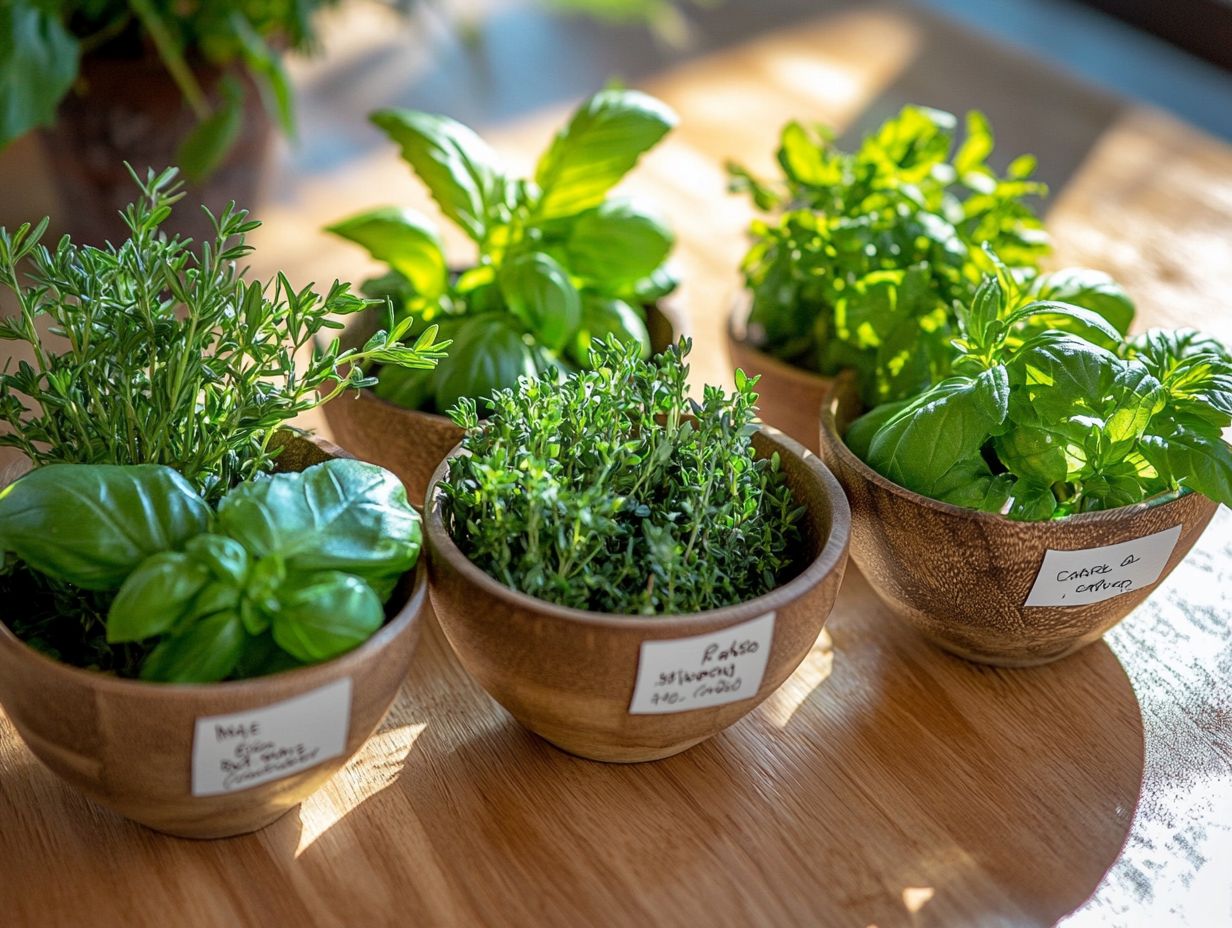
Cinnamon is not just a delightful sweet spice; it contains many antioxidants and has a supportive role in metabolic health. This makes it a favored ingredient in both cooking and herbal remedies.
Throughout history, various cultures have cherished this aromatic bark for its culinary allure and traditional healing practices. In Ayurvedic medicine, for example, cinnamon is known as a warming spice that aids digestion and serves as a natural remedy for colds.
Modern research highlights its potential in managing blood sugar levels. Many dietary supplements incorporate this spice because of its benefits, enhancing overall health and vitality in daily life.
5. Holy Basil: An Ayurvedic Herb with Immune-Boosting Properties
Meet Holy Basil, also known as Tulsi the incredible herb that can supercharge your immune system! It is celebrated for its remarkable immune-boosting properties and contributions to overall health and wellness.
But its benefits extend far beyond just immune support. This powerful herb has traditionally been used to help alleviate stress and anxiety, making it an invaluable part of modern wellness routines.
Packed with antioxidants and adaptogenic compounds, Holy Basil helps your body adapt to stress by reducing cortisol levels. This promotes a sense of calm.
Incorporating Tulsi into your daily life can be effortlessly simple. Whether you brew a soothing cup of tea or opt for dietary supplements, both offer a cherished moment of tranquility amid the chaos of a busy schedule.
By embracing this herbal remedy, you may discover a natural ally in your pursuit of balance and serenity in today s fast-paced world.
How Can These Herbs Be Used in Cooking?
Start adding herbs like turmeric today! They elevate flavors and pack a punch of health benefits, highlighting their dual role as culinary delights and medicinal powerhouses.
These vibrant additions can be seamlessly blended into various dishes, from comforting soups to refreshing salads, where their unique properties shine.
Take turmeric, for example. It enhances curries or even oatmeal while preserving its earthy flavor and healing compounds. Cooking it gently with coconut milk beautifully amplifies its benefits.
Ginger, on the other hand, shines in stir-fries or comforting teas. Its spiciness dances with sweet and salty notes. And don t underestimate garlic; when saut ed lightly, it infuses your dishes with depth while maintaining its potent anti-inflammatory properties.
By carefully balancing these herbal flavors with fresh ingredients like citrus or leafy vegetables, you can create meals that are not only delicious but also rich in health benefits.
What Are the Key Nutrients and Compounds Found in These Herbs?
The key nutrients and compounds found in herbs like turmeric, ginger, and garlic are essential for their medicinal properties. They offer a range of health benefits that enhance your overall well-being.
For example, curcumin in turmeric is celebrated for its potent antioxidant and anti-inflammatory effects, which can help alleviate chronic diseases. Meanwhile, gingerol in ginger provides similar advantages and stands out for its remarkable ability to combat nausea and promote digestive health.
When you compare the two, you can see that curcumin primarily focuses on reducing inflammation and oxidative stress, while gingerol takes a more versatile approach to address digestive wellness and nausea relief.
By incorporating both into your diet, you create a holistic strategy for health, leveraging the complementary strengths of each herb.
What Are the Potential Side Effects of Using These Herbs?
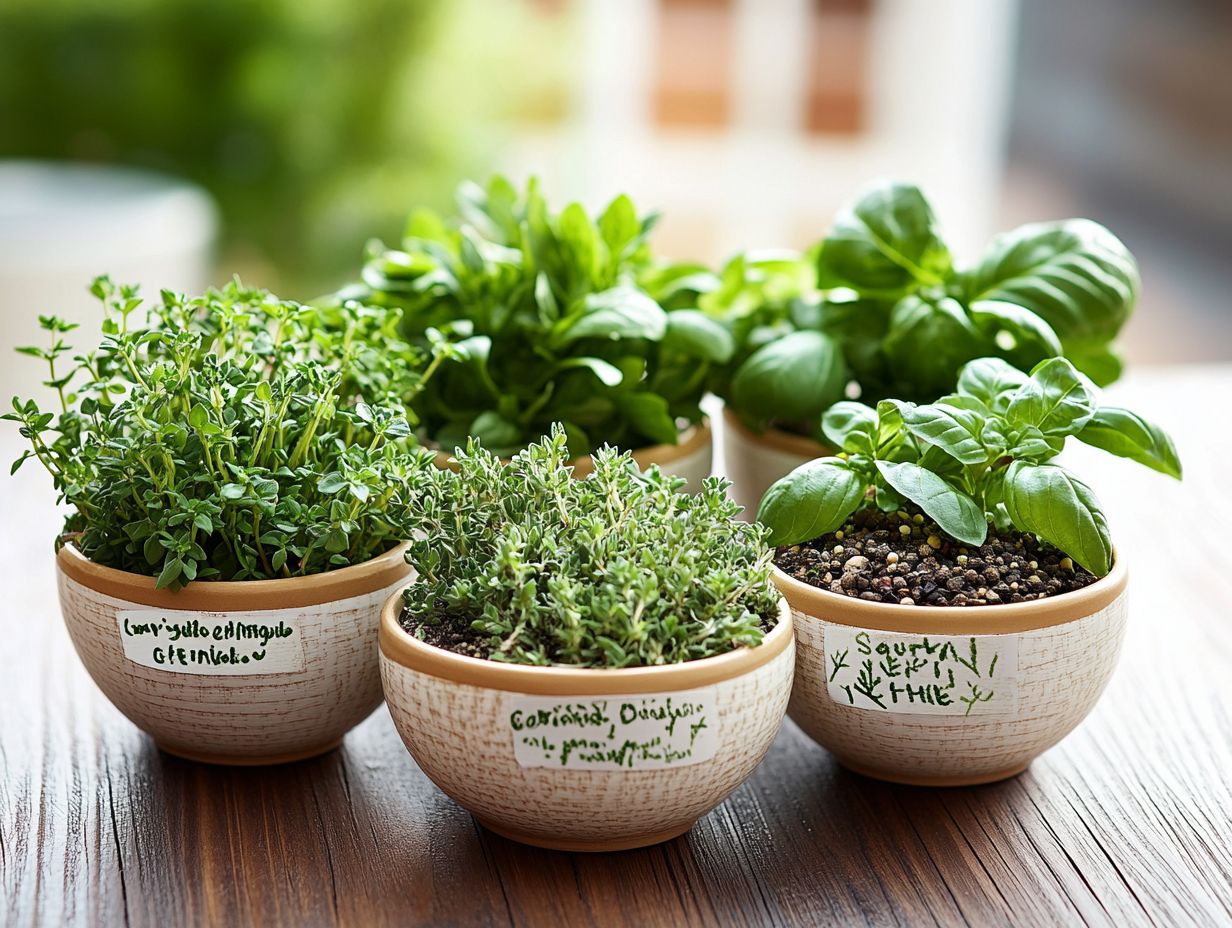
Herbs like turmeric, ginger, and garlic can work wonders for your health. However, it s important to consider their potential side effects and risks, especially for some individuals.
If you have stomach issues, you might experience discomfort, such as nausea or an upset stomach. Rarely, these herbs can cause allergic reactions, leading to mild rashes or more serious complications.
These herbs can interact with different medications. Be cautious if you take blood thinners or medications for high blood pressure.
To consume these herbs safely, consult a healthcare professional, especially if you have existing health conditions or take other medications. This way, you can enjoy these herbs safely!
What Are the Different Forms of These Herbs Available in the Market?
The market offers a delightful array of herbs, including turmeric, ginger, and garlic. You can find them fresh, dried, powdered, or as herbal extracts.
Each format has its unique advantages. Fresh herbs add vibrant flavor and nutrients, while dried options are convenient and last longer.
Powdered forms mix easily into recipes. Extracts provide concentrated effects for those seeking maximum potency.
When buying herbal supplements, prioritize quality. Check for certifications and sourcing information to ensure you receive the health benefits without contaminants or fillers.
How Can These Herbs Be Incorporated into a Healthy Lifestyle?
Incorporating herbs like turmeric, ginger, and garlic into your daily routine can enhance your wellness. These herbs provide natural medicinal properties and health benefits.
Here are some ways to use them:
- Sprinkle turmeric into your morning smoothies.
- Add ginger to stir-fries for a delightful kick.
- Dice garlic into salads or roast it with your favorite vegetables.
Steep ginger in hot water for soothing tea. Garlic-infused olive oil makes a tasty dressing. Emphasizing these herbs elevates your meals and helps you meet your nutritional goals!
Are There Any Scientific Studies Supporting the Health Benefits of These Herbs?
Many scientific studies confirm the health benefits of herbs like turmeric, ginger, and garlic. They showcase impressive medicinal properties and effectiveness for various health conditions.
One noteworthy study in the Journal of Medicinal Food explored turmeric’s anti-inflammatory properties through a double-blind trial with arthritis participants. This approach revealed significant reductions in pain and stiffness, suggesting turmeric could help those with inflammation.
Another study in the Journal of Nutrition looked at ginger’s effects on digestion. It found that ginger not only improved digestion but also eased nausea.
These studies show that herbal remedies can be effective dietary supplements!
Frequently Asked Questions
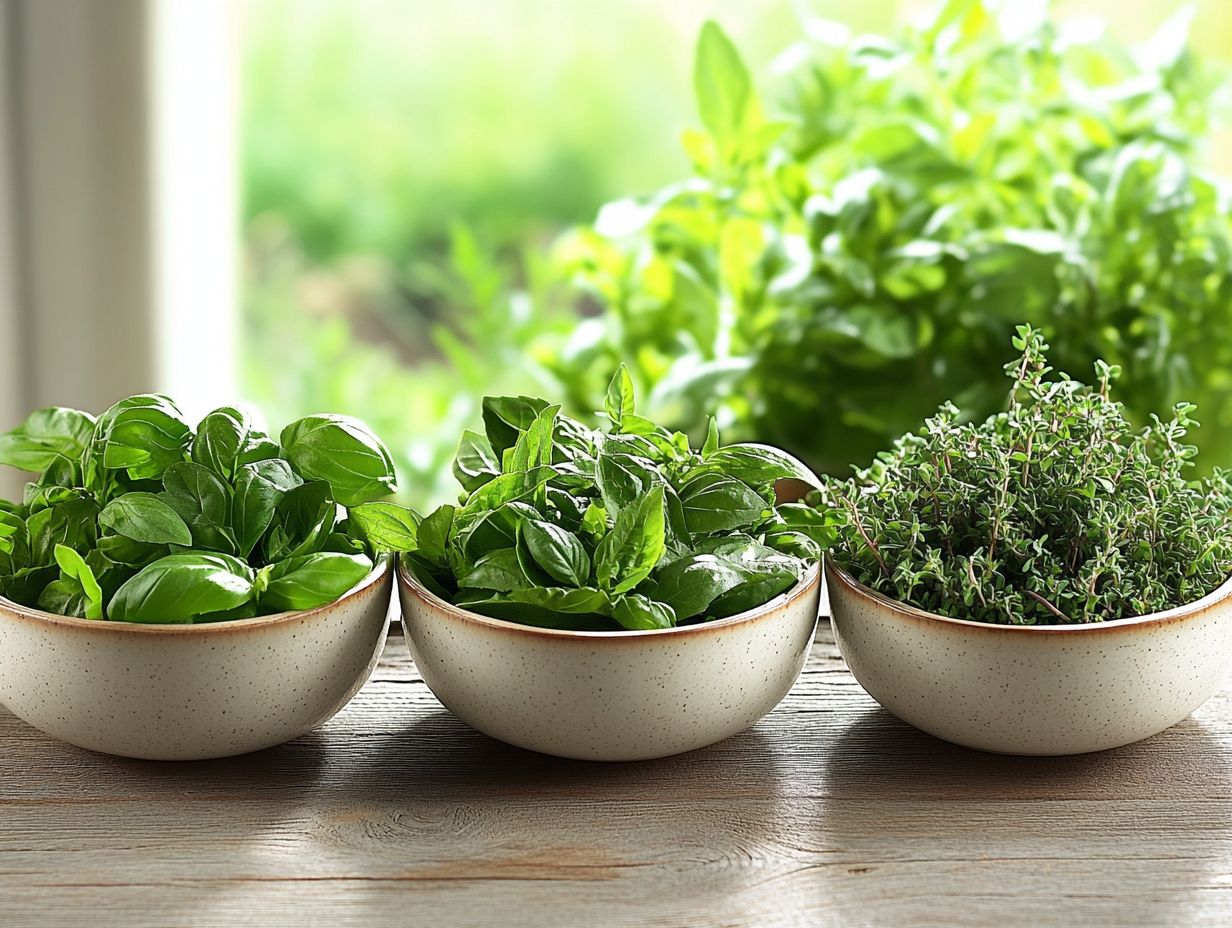
What are the top 5 popular herbs and their health benefits?
Discover the top 5 herbs for cooking and health: turmeric, ginger, garlic, peppermint, and cinnamon. Each offers unique health benefits that can enhance your well-being.
How can turmeric be beneficial for my health?
Turmeric has long been valued for reducing swelling and pain. It contains curcumin, a natural compound that fights inflammation and may also protect against cell damage.
In what ways can ginger improve my health?
Ginger is a powerhouse for your health, aiding digestion and relieving nausea. Its anti-inflammatory properties make it a great choice for those with joint pain.
What are the health benefits of garlic?
Garlic has been used for centuries in kitchens and medicine cabinets. It may help lower cholesterol, reduce blood pressure, and boost your immune system.
Can peppermint really help with migraines?
Peppermint is renowned for its soothing properties, particularly for migraines. Applying peppermint oil to the temples can alleviate pain, and its aroma helps with nausea.
What are the potential health benefits of cinnamon?
Cinnamon is not just a delicious spice; it may also offer significant health benefits. Research suggests it can help control blood sugar levels and support heart health.

